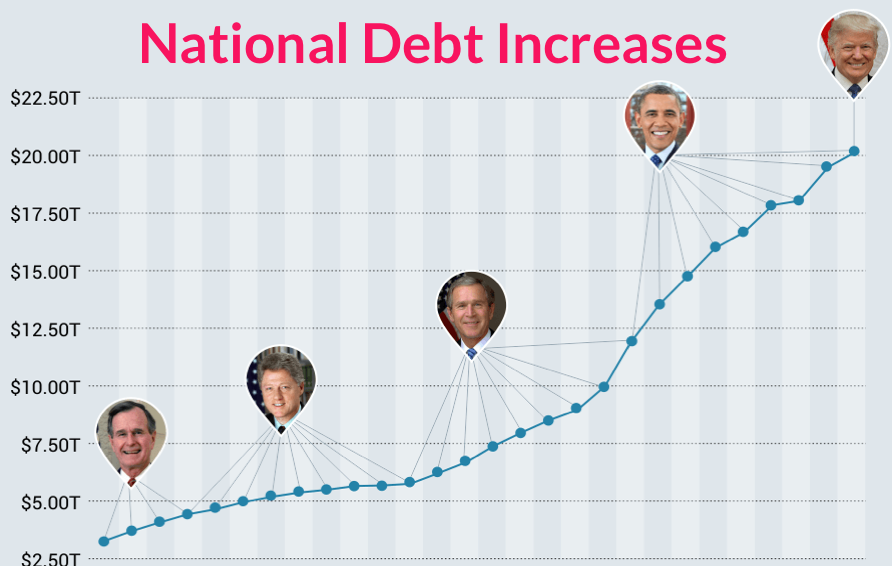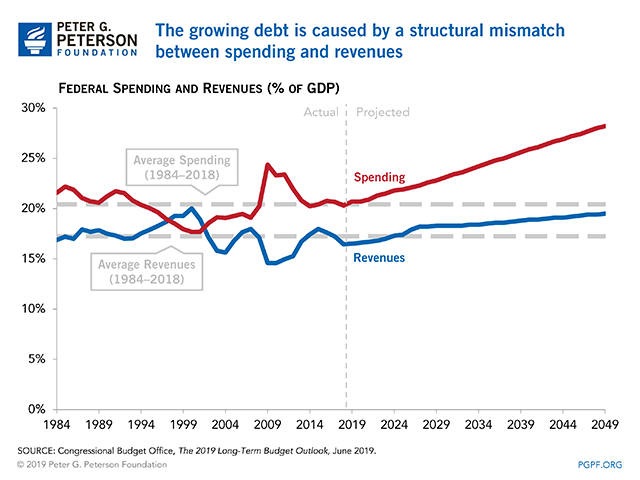That works for me. What do you want to cut? Social Security? Medicare? Medicaid? Farm subsidies? Green energy funding? Education? What specifically do you want to cut?
I would start with a 2.5 percent across the board cut every year for the next 5 years. That is from every department in the US Government to include the DOD.
Let the departments decide where to cut, they know where the waste and abuse is.
I would also immediately end the "use it or lose it next time" mentality that forces department to spend every dime given because they are afraid of losing it on the next budget. When I was in the Corps we would go "shopping" every September to make sure we spent every time, and starting in August I would have to schedule cross country flights for the pilots even if they did not need the flight time to spend every dime of our TAD and fuel money.
After those 5 years I would then start on more strategic cuts.
What you experiences is true of every single government run anything. That is universally true. Every single department, is zero incentive to be frugal, because if you don't spend every dime the government gives you, then is both makes it impossible to make the case you need more money, and it gives critics the case that you don't need as much as you were given, because you the fact you didn't spend it, means you didn't need it.
The only reason you hear about waste in the corps, but not as much in any other government agency, is simply because of the people who know about it.
People that are in the FBI for example, are in the FBI for a career that will last a life time. They are not going to report waste, because they don't want to blow their promotion, or even risk losing their careers.
People in the military, are there, and then they leave. I've heard dozens of stories like your.
But the truth is, all government agencies operate this way. At the end of the fiscal year, they spend every dollar they have. You can't risk having money left over, and then something happens and you need more funding, and ignorant politicians go.... but you didn't even spend all the money from last year, so why do you need more?
Cutting defense is really risky. The problem with doing that, is if a conflict breaks out, and we need to intervene, the cost to setup a new weapons plant, is many times more expensive, than keeping an existing plant open.
The cost to setup a new Air Force base, is many times more expensive than maintaining an existing base.
I happen to go to an old air force base, that had been decommissioned under Clinton, and within 10 years, the entire field and runways were all completely unusable. If they ended up needing that base, it would cost millions of dollars in renovations, whereas if they had maintained it, it could have lasted decades longer. Just weeds alone, will destroy the runway, if no one seals it, and clears it.
Now I'm open to the idea we can cut the military.... but we need to be a little more thoughtful than just a blanket cut.
The pattern we've seen in history, is that we cut the military in the 70s, and then Reagan had to rebuild it which was very expensive. Then Clinton cut the military in the 90s, and Bush had to rebuild it, which was very expensive. Then Obama cut the military, and now Trump is rebuilding it.
It would have been cheaper and more cost effective, if we had just maintained a steady budget on the military, without cutting everything and having to rebuild it over and over.
It would be even cheaper not to start decade long wars that are not needed and to not invade sovereign nations that were no threat to us.
Just a thought...
*sigh*....
The Rockefeller report, which as the name suggests was headed by Jay Rockefeller, a Democrat, concluded that all of the information we had at the time we went into Iraq, suggested that everything Bush said was justification for going into Iraq, was true.
That's a fact. Not debatable. If you want to argue with an investigation by Congress on the intelligence we had going into Iraq, be my guest. But until that conclusion is overturned, Bush was reacting to the best intel we had.
I get it, that it is easy to sit here with 20/20 hindsight. But at that time, the intel said that Saddam was in fact pursuing WMDs, and working relations with terrorist groups.
Now if you have a magic 8 ball the reveals all secrets, so we can avoid any possible wrong information, by all means contact the government, and provide the infallible source of international intelligence.
Until then.... this garbage complaint about how we should not have done X and Y, when you were not there, and didn't see the information Bush saw..... yeah grow up.




